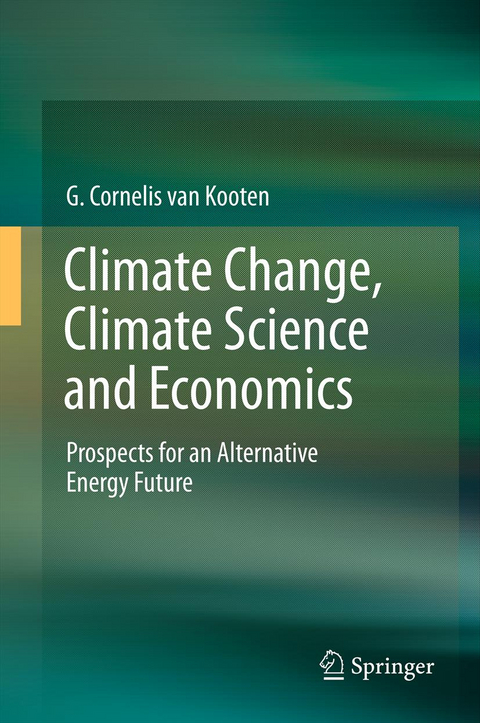
Climate Change, Climate Science and Economics
Prospects for an Alternative Energy Future
Seiten
2014
Springer (Verlag)
978-94-017-8116-9 (ISBN)
Springer (Verlag)
978-94-017-8116-9 (ISBN)
This volume enables readers to understand the complexity associated with climate change policy and the science behind it. For example, the author describes the criticism and defense of the widely known “hockey stick” temperature graph derived from combining instrumental data and proxy temperature indications using tree ring, ice core and other paleoclimatic data.
Readers will also learn that global warming cannot easily be avoided by reducing CO2 and other greenhouse gas emissions in rich countries. Not only is emissions reduction extremely difficult in rich countries, but demands such as the UN mandate to improve the lives of the poorest global citizens cannot be satisfied without significantly increasing global energy use, and CO2 emissions. Therefore, the author asserts that climate engineering and adaptation are preferable to mitigation, particularly since the science is less than adequate for making firm statements about the Earth’s future climate.
Readers will also learn that global warming cannot easily be avoided by reducing CO2 and other greenhouse gas emissions in rich countries. Not only is emissions reduction extremely difficult in rich countries, but demands such as the UN mandate to improve the lives of the poorest global citizens cannot be satisfied without significantly increasing global energy use, and CO2 emissions. Therefore, the author asserts that climate engineering and adaptation are preferable to mitigation, particularly since the science is less than adequate for making firm statements about the Earth’s future climate.
Readers will also learn that global warming cannot easily be avoided by reducing CO2 and other greenhouse gas emissions in rich countries. Not only is emissions reduction extremely difficult in rich countries, but demands such as the UN mandate to improve the lives of the poorest global citizens cannot be satisfied without significantly increasing global energy use, and CO2 emissions. Therefore, the author asserts that climate engineering and adaptation are preferable to mitigation, particularly since the science is less than adequate for making firm statements about the Earth’s future climate.
Readers will also learn that global warming cannot easily be avoided by reducing CO2 and other greenhouse gas emissions in rich countries. Not only is emissions reduction extremely difficult in rich countries, but demands such as the UN mandate to improve the lives of the poorest global citizens cannot be satisfied without significantly increasing global energy use, and CO2 emissions. Therefore, the author asserts that climate engineering and adaptation are preferable to mitigation, particularly since the science is less than adequate for making firm statements about the Earth’s future climate.
1. Introduction.- 2. Weather and the Instrumental Record.- 3. Climate Science and Paleoclimatology.- 4. Emission Scenarios and Climate Modeling.- 5. Alternative Explanations.- 6. How Economists Measure Wellbeing: Social Cost-Benefit Analysis.- 7. Economic Assessment of the Damages Caused by Global Warming.- 8. Implementing Policy.- 9. Avoiding Emissions Reduction: Terrestrial Carbon Sinks.- 10. Economic Growth, Energy and Climate Change.- 11. Electricity Markets and Wind Energy.- 12. Climate Change Policy Encounters the Real World.- Index.
| Erscheint lt. Verlag | 21.9.2014 |
|---|---|
| Zusatzinfo | XXIV, 468 p. |
| Verlagsort | Dordrecht |
| Sprache | englisch |
| Maße | 155 x 235 mm |
| Themenwelt | Naturwissenschaften ► Biologie ► Ökologie / Naturschutz |
| Naturwissenschaften ► Geowissenschaften ► Geografie / Kartografie | |
| Naturwissenschaften ► Geowissenschaften ► Geologie | |
| Naturwissenschaften ► Geowissenschaften ► Meteorologie / Klimatologie | |
| Wirtschaft ► Volkswirtschaftslehre | |
| Schlagworte | climate change policy • Economic Development • Economic Policy • Energy Economics • energy-environmental dilemma |
| ISBN-10 | 94-017-8116-8 / 9401781168 |
| ISBN-13 | 978-94-017-8116-9 / 9789401781169 |
| Zustand | Neuware |
| Informationen gemäß Produktsicherheitsverordnung (GPSR) | |
| Haben Sie eine Frage zum Produkt? |
Mehr entdecken
aus dem Bereich
aus dem Bereich
Grundlagen, Systeme, Anwendung, Wirtschaft
Buch | Hardcover (2024)
Carl Hanser (Verlag)
CHF 139,95


